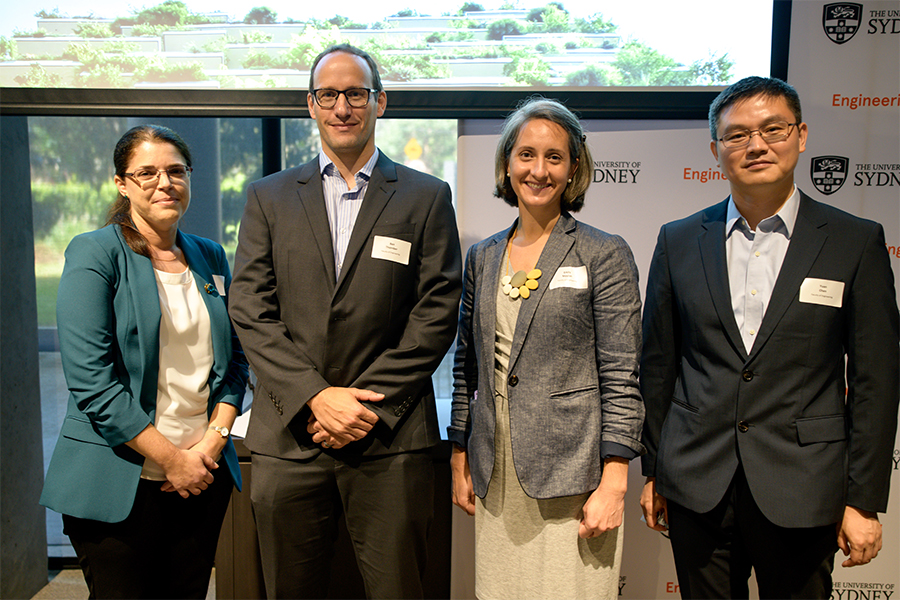We aim to build a prosperous low-emissions future through strategic collaborations between businesses and researchers across all fields of endeavour.

In order to avoid dangerous climate change due to greenhouse gas emissions, a rapid, coordinated, multidisciplinary response is urgently needed. The Net Zero Initiative (NZI) encompasses all the leading-edge research at the University of Sydney directed towards net zero greenhouse gas emissions. It spans several of the University’s Faculties and Institutes, bringing together world-class researchers committed to solving difficult challenges as we transition to a net zero future.
Collaboration is central to the NZI’s mission. By fostering and incentivising cross-disciplinary collaboration, the NZI has established a research and innovation network that not only connects research leaders within the University but also extends to our business partners and domestic and international research partners to deliver solutions. It has the critical mass, research expertise and multi-disciplinary focus required to attract large-scale competitive and industry funding. In this way, the NZI aims to foster the rapid development of new net-zero technologies and ensure those new ideas can be quickly commercialised so they reach the market as soon as possible.
The opportunity
The International Energy Agency forecasts that the total annual investment in energy infrastructure will rise to $US5 trillion by 2030, adding an extra 0.4% point a year to annual global GDP growth. This highlights two important features of the transition to net zero emissions. First, the level of investment is massive, and this will be reflected in private and public funds directed towards R&D, commercialisation and deployment of low emissions technologies. Secondly, the transition to net-zero emissions will not create a cost burden but will instead offer new business opportunities alongside positive outcomes to society.
This critical transition requires the development of affordable low-emissions technologies as well as new approaches to carbon removal – such as direct air capture of CO2 – which will reduce the amount of CO2 in the atmosphere and offset any fossil fuel emissions that prove difficult or impossible to replace. It will also be vital to have an investment community better equipped to manage the risk associated in the deployment of those advancements. As such, the NZI is undertaking research across all these areas.
Enabling research themes

The research collaboration of the Net Zero Initiative spans several of the University’s Faculties and Institutes, bringing together world-class researchers who are committed to solving the difficult challenges on the transition to a net zero future. Collaboration is central to the NZI’s mission, and our research teams work closely with our business partners and domestic and international research partners to deliver solutions. It has the critical mass, research expertise and multi-disciplinary focus required to attract large-scale competitive and industry funding.
Our research explores new science, emerging technologies and new processes and systems. We have defined four Enabling Research Themes that maximise opportunities for collaboration and to best support our business partners. These are Emissions Avoidance through demand reduction, Emissions Avoidance through zero emissions energy, Carbon Removals, and Climate Change Risk.
Demand for education

Today’s students need access to educational opportunities that will provide the knowledge and skills needed to address the challenges of climate change. Meanwhile, society urgently needs a body of trained sustainable development professionals to make new advances in low-emissions and carbon capture technologies as well as those who help businesses transition to the net zero world.
Our Net Zero Initiative provides a focal point for delivering this education and training at an ambitious scale, providing both deep technical skills and broader multidisciplinary understanding of the advances and challenges on the path to net zero emissions. We educate the current and future workforce, and build strategic leadership capabilities and organisations. We also work with young people to understand the impacts of climate anxiety and identify what mental health infrastructure will be needed to support them in a world with a changing climate.
Industry and government aligned

The Australian Government and all state and territory governments have committed to net zero emissions at or before 2050. Further, the Business Council of Australia supports achieving a net zero emissions economy by 2050, as do and many of Australia’s largest businesses. Moreover, these businesses are beginning to commit large sums to achieve their net zero targets.
Only so much can be achieved through deployment of low-cost sources of renewable electricity, governments and businesses are also looking to address some of the harder to abate emissions sources through novel technologies as well as new industrial and agricultural processes. The Net Zero Initiative acknowledges this new imperative and is therefore developing new fuels such as green hydrogen, new industrial products such as low-emissions cement and new ways to manage agricultural land to increase soil carbon.
The NZI is working closely with Industry, Government and the not-for-profit sector via our two key Boards.
Our research

